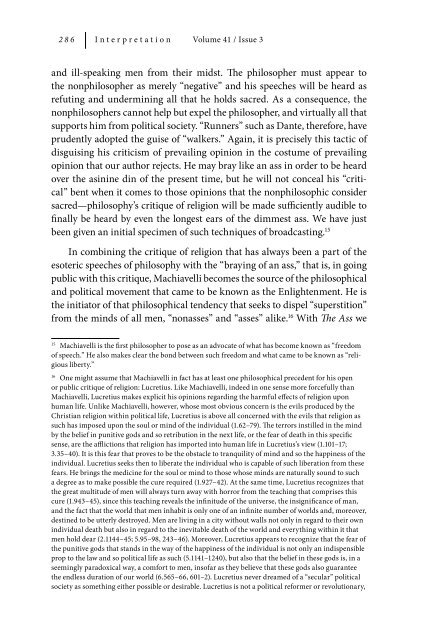1G0xxeB
1G0xxeB
1G0xxeB
You also want an ePaper? Increase the reach of your titles
YUMPU automatically turns print PDFs into web optimized ePapers that Google loves.
2 8 6 I n t e r p r e t a t i o n Volume 41 / Issue 3and ill-speaking men from their midst. The philosopher must appear tothe nonphilosopher as merely “negative” and his speeches will be heard asrefuting and undermining all that he holds sacred. As a consequence, thenonphilosophers cannot help but expel the philosopher, and virtually all thatsupports him from political society. “Runners” such as Dante, therefore, haveprudently adopted the guise of “walkers.” Again, it is precisely this tactic ofdisguising his criticism of prevailing opinion in the costume of prevailingopinion that our author rejects. He may bray like an ass in order to be heardover the asinine din of the present time, but he will not conceal his “critical”bent when it comes to those opinions that the nonphilosophic considersacred—philosophy’s critique of religion will be made sufficiently audible tofinally be heard by even the longest ears of the dimmest ass. We have justbeen given an initial specimen of such techniques of broadcasting. 15In combining the critique of religion that has always been a part of theesoteric speeches of philosophy with the “braying of an ass,” that is, in goingpublic with this critique, Machiavelli becomes the source of the philosophicaland political movement that came to be known as the Enlightenment. He isthe initiator of that philosophical tendency that seeks to dispel “superstition”from the minds of all men, “nonasses” and “asses” alike. 16 With The Ass we15Machiavelli is the first philosopher to pose as an advocate of what has become known as “freedomof speech.” He also makes clear the bond between such freedom and what came to be known as “religiousliberty.”16One might assume that Machiavelli in fact has at least one philosophical precedent for his openor public critique of religion: Lucretius. Like Machiavelli, indeed in one sense more forcefully thanMachiavelli, Lucretius makes explicit his opinions regarding the harmful effects of religion uponhuman life. Unlike Machiavelli, however, whose most obvious concern is the evils produced by theChristian religion within political life, Lucretius is above all concerned with the evils that religion assuch has imposed upon the soul or mind of the individual (1.62–79). The terrors instilled in the mindby the belief in punitive gods and so retribution in the next life, or the fear of death in this specificsense, are the afflictions that religion has imported into human life in Lucretius’s view (1.101–17;3.35–40). It is this fear that proves to be the obstacle to tranquility of mind and so the happiness of theindividual. Lucretius seeks then to liberate the individual who is capable of such liberation from thesefears. He brings the medicine for the soul or mind to those whose minds are naturally sound to sucha degree as to make possible the cure required (1.927–42). At the same time, Lucretius recognizes thatthe great multitude of men will always turn away with horror from the teaching that comprises thiscure (1.943–45), since this teaching reveals the infinitude of the universe, the insignificance of man,and the fact that the world that men inhabit is only one of an infinite number of worlds and, moreover,destined to be utterly destroyed. Men are living in a city without walls not only in regard to their ownindividual death but also in regard to the inevitable death of the world and everything within it thatmen hold dear (2.1144–45; 5.95–98, 243–46). Moreover, Lucretius appears to recognize that the fear ofthe punitive gods that stands in the way of the happiness of the individual is not only an indispensibleprop to the law and so political life as such (5.1141–1240), but also that the belief in these gods is, in aseemingly paradoxical way, a comfort to men, insofar as they believe that these gods also guaranteethe endless duration of our world (6.565–66, 601–2). Lucretius never dreamed of a “secular” politicalsociety as something either possible or desirable. Lucretius is not a political reformer or revolutionary,


